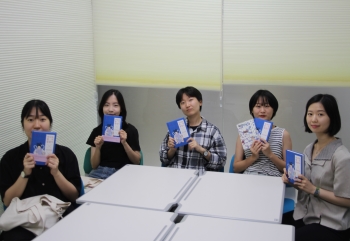“The Fairy Did Not Tolerate” is a book that reinterprets 10 Korean folktales with anti-misogyny and solidarity of social minorities. The book is written by a book club named Gu-o, which means to “awaken together” in Chinese characters. Gu-o consists of five Ewha students.
Members initially met to simply read diverse genres of books and exchange thoughts. They noticed all the members were commonly interested in feminism as each discussions they had included feminist perspective.
By 2017, members reached a consensus on leaving behind a work that could wrap up their years-long book club activity. Inspired by their previous discussions, Gu-o created the “The Fairy Did Not Tolerate.”

The title of the book is the name of their adaption of the “The Fairy and the Woodcutter.” The original tale depicts a wood cutter who disturbs a fairy from heading back to her home to marry her.
Gu-o told that the titles of adaptations were made first, then that of the entire book was selected among them. Upon choosing “The Fairy Did Not Tolerate,” Lee Kyung-min from Division of International Studies gave an explanation.
“‘The Fairy and the Woodcutter’ is a folktale in which adult readers can share a bond. The bond comes from the common realization - finding out the fact that the protagonist was actually the bad guy,” Lee said.
As a big part of the purpose of their book was to un-familiarize the original tales which bear numerous misogynic ideals, the members all agreed on the decision.
Gu-o shared concerns and resolutions while making their episodes.
The first one on the table was “The Tale of Ms.Park,” which is a historical fiction based on the times of beongjahoran, the war between Daicing and Joseon in the 17th century. In the original tale, Ms. Park uses her magical powers to help her politician husband and later take revenge against the enemy that has massacred the people of her country.
At first, Gu-o hesitated with adapting the story as it already had one of the most proactive woman protagonist. To avoid shadowing the character’s heroism yet add more feminist ideals to the story, Gu-o decided to strengthen depiction of female solidarity.
The process involved inserting an additional storyline. The newly adapted story encompassed the historical fact about women who were sent to Daicing as tributes. The women, who in reality were never welcomed home for losing their fidelity, were able to meet a happier ending in Gu-o’s adaptation.
The other one is “Kongjwi and Patjwi,” a Korean Cinderella tale where the protagonist, Kongjwi, with the help of her animal friends detour the tricks of her stepfamily to marry the new county magistrate.
Members told that their initial focus of adaptation was on distancing with the lookism against the heroine. However, they found a more effective method to let the readers realize the misogyny imbedded within them.
Du Ae-rin from Division of English Language & Literature told the change within “Kongjwi and Patjwi” induced the biggest surprise from their readers.
Furthermore, Gu-o showed their love for adaptation of “Halfie,” which is a tale of a boy who is born with only half of his body. The original tale focuses on the journey of the boy, who fights through the contempt of others with his exceptional strength and intelligence.
However, in Gu-o’s adaptation, the protagonist is the bride of Halfie, who is given to him as the winning prize of a bet.
“It was part of our experiment to try different formats,” Lee noted. “Illuminating a previously neglected character was one we found very interesting and satisfactory in terms of results too.”
The story of the bride is connected with Gu-o’s adaption of “The Abandoned Princess.”
Members of Gu-o lastly spoke of their impressions upon the publication of “The Fairy Did Not Tolerate.”
Many of them were content in the aspect that they were able to give positive impact on the society. A member shared that one of them even found a post of an elementary school teacher who made worksheets based on their novel.

